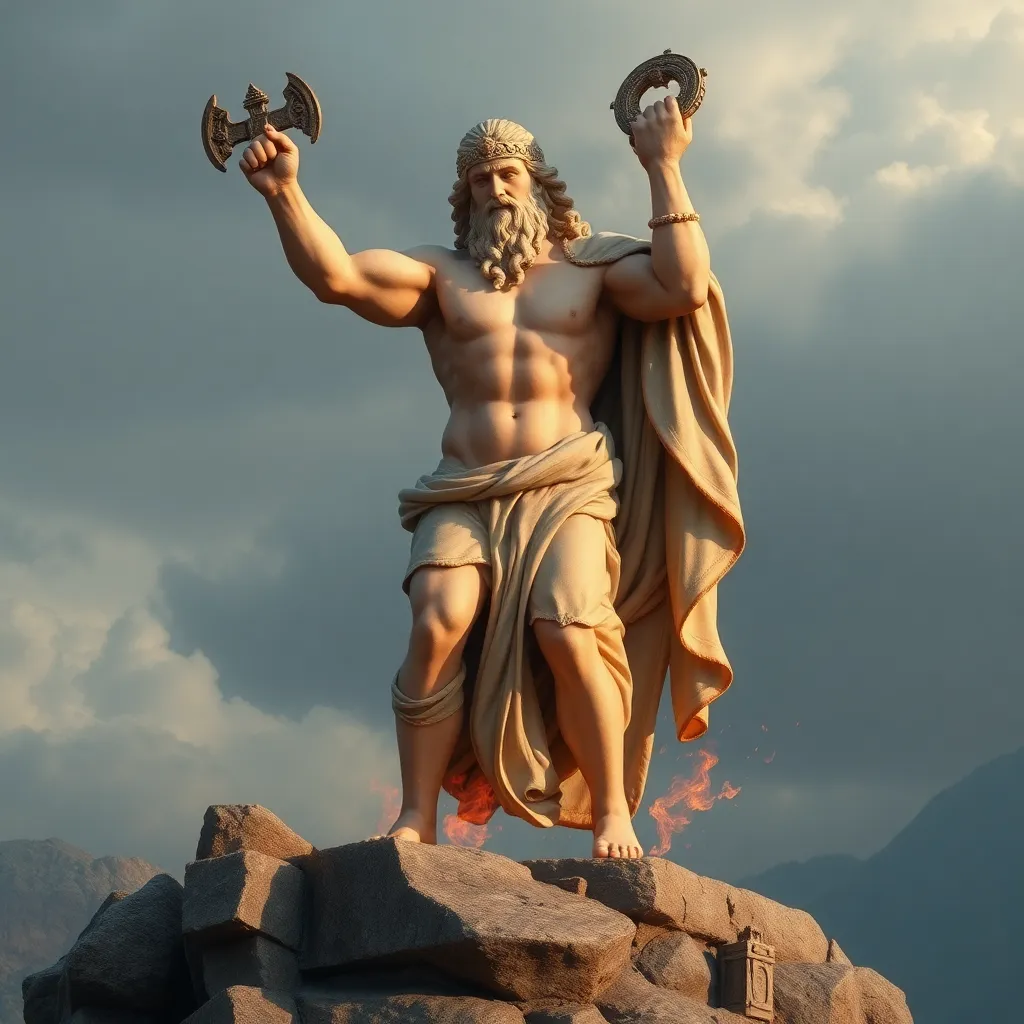The Myths of Hephaestus and His Rivalries: Conflicts with Other Gods
I. Introduction
Hephaestus, the Greek god of fire, metalworking, and craftsmanship, occupies a unique position in the pantheon of Olympian deities. Known for his skill in forging and creating beautiful objects, he represents the essence of artistry and ingenuity. However, his relationships with other gods, marked by rivalries and conflicts, reveal deeper themes within Greek mythology.
Understanding Hephaestus’ rivalries is crucial for grasping the dynamics of the Olympian family and the interplay of power and creativity among the gods. This article delves into the significant rivalries of Hephaestus, exploring how they shaped his character and legacy within the mythological narrative.
II. Hephaestus: The Outsider God
Hephaestus’ origin story is one of struggle and rejection. Born to Hera, he was cast out of Olympus due to his deformities. Unlike his radiant fellow deities, Hephaestus is often depicted as physically imperfect, which sets him apart in a world that values beauty and perfection.
His status as an outsider not only differentiates him from other Olympians but also influences his relationships with them. While gods like Zeus and Apollo embody authority and charisma, Hephaestus embodies resilience and creativity. His outsider status symbolizes the archetype of the misunderstood artist, striving to earn acceptance and respect in a realm that often overlooks his contributions.
III. Hephaestus and Hera: A Maternal Rivalry
The relationship between Hephaestus and his mother, Hera, is fraught with tension. Rejected at birth, Hephaestus’ feelings of abandonment shape his personality. According to myth, Hera threw him from Olympus, resulting in his physical deformities. This rejection instilled in him a desire for approval, often manifesting through his craftsmanship.
This maternal rivalry has profound implications for Hephaestus’ character. His quest for acceptance drives him to create magnificent works, but it also cultivates a sense of bitterness toward those who embody the traits he lacks. Hera’s influence is a constant reminder of his outsider status, shaping the dynamics of the Olympian family and highlighting themes of acceptance and rejection.
IV. The Conflict with Ares: Love and War
Hephaestus’ marriage to Aphrodite, the goddess of love and beauty, contrasts sharply with his own physical appearance. This union, however, is marred by infidelity, as Aphrodite engages in an affair with Ares, the god of war. The love triangle creates a significant rivalry between Hephaestus and Ares, highlighting themes of betrayal and vengeance.
Upon discovering the affair, Hephaestus devised a cunning plan to expose the lovers. He crafted a fine net, ensnaring them in the act, and presented them to the other gods, illustrating his intelligence and craftsmanship. This act of revenge reveals Hephaestus’ ability to wield his creativity as a weapon, turning his pain into a tool for justice.
The consequences of this rivalry extend beyond personal betrayal; they reflect the broader tensions between love and fidelity in the divine realm, further complicating the relationships among the gods.
V. The Artistic Rivalry with Athena
Hephaestus’ rivalry with Athena centers around their shared domain of craftsmanship and artistry. Both deities are celebrated for their skills, yet their approaches to creation differ significantly. Athena, known for her wisdom and strategic thinking, represents intellectual prowess, while Hephaestus embodies the physical act of creation through fire and metal.
One notable myth illustrating their rivalry involves a competition to create the most beautiful object. In this contest, Hephaestus crafted a stunning shield, while Athena produced an equally magnificent tapestry. The outcome of their rivalry often emphasizes the importance of balance between intellect and physical skill in the creative process.
Culturally, this rivalry reflects the ancient Greek values of art and craftsmanship, highlighting the significance of both divine and human creativity in society.
VI. The Clash with Prometheus: Innovation vs. Tradition
The relationship between Hephaestus and Prometheus, the titan known for stealing fire from the gods to give to humanity, presents a fascinating conflict between innovation and tradition. Hephaestus, as the god of fire, represents the traditional craftsmanship associated with fire, while Prometheus symbolizes revolutionary change and innovation.
The myth of fire is central to their rivalry. While Hephaestus safeguards the divine knowledge of fire, Prometheus challenges the status quo by sharing it with mortals. This act of defiance leads to severe consequences for Prometheus, who is punished by Zeus, while Hephaestus is caught in the middle, torn between allegiance to the gods and sympathy for humanity.
The philosophical implications of this rivalry raise questions about the nature of progress and the responsibilities that come with innovation, showcasing a tension between maintaining tradition and embracing change.
VII. Hephaestus and Zeus: Power Struggles in Olympus
The relationship between Hephaestus and his father, Zeus, is complex and often fraught with power struggles. Hephaestus, despite his divine lineage, is seen as subordinate to Zeus, who embodies authority and control. Various myths depict their conflicts, often centering around themes of power, respect, and acceptance.
One key myth involves Hephaestus creating an intricate throne for Zeus, only to be trapped in it when he refuses to return to Olympus. This act of defiance illustrates Hephaestus’ desire for autonomy and recognition, challenging Zeus’ authority. The eventual reconciliation between the two reflects the delicate balance of power in Olympus, as well as the necessity of cooperation among the gods.
The impact of these rivalries significantly shapes Hephaestus’ role in Olympus, highlighting his contributions as a craftsman while navigating the complexities of divine hierarchy.
VIII. Conclusion
The rivalries of Hephaestus underscore the intricate relationships among the Olympian gods, revealing themes of conflict, creativity, and the pursuit of acceptance. From his maternal rivalry with Hera to his conflicts with Ares, Athena, Prometheus, and Zeus, Hephaestus embodies the struggles of the artist seeking validation in a world dominated by ideals of beauty and power.
Ultimately, Hephaestus’ legacy in Greek mythology serves as a testament to the complexities of creativity and the human experience, reminding us that even the most skilled and innovative individuals may face rejection and rivalry in their quest for recognition.




